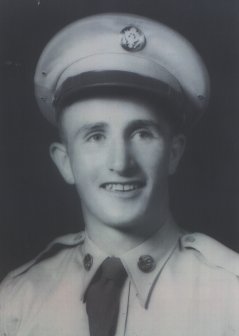 Born in Coolikerane, Millstreet on the 29th of September 1929, John Corcoran emigrated to the United States, and settled in Lafayette Parish in Louisana where his uncle resided.
Born in Coolikerane, Millstreet on the 29th of September 1929, John Corcoran emigrated to the United States, and settled in Lafayette Parish in Louisana where his uncle resided.
He was one of only a few who volunteered for military service, whence he became Private First Class Corcoran, a member of the 32nd Infantry Regiment, 7th Infantry Division.
On a day when many were wounded or killed, he was seriously wounded by enemy mortars while fighting on September 24, 1950, as the 32nd attempted to create a bridgehead on the opposite side of the Han River close to Soeul in South Korea. John was wounded when he instinctively and nobly used his body to protect his injured friend and comerade Paul Oliver. He died of his wounds on October 2, 1950 in Osaka Hospital, Japan.
He was laid to rest at Calvary Cemetery, Lafayette, Lafayette Parish Louisiana, USA (see photos below). Paul Olivier whose life he saved continued to maintain John’s tomb in Lafayette, but Paul himself passed away recently – December 9th 2014, so one wonders if it is maintained anymore but it is still being maintained beautifully (see photos below).
Posthumously Private First Class Corcoran was awarded the Purple Heart, the Combat Infantryman Badge, the Korean Service Medal, the United Nations Service Medal, the National Defense Service Medal, the Korean Presidential Unit Citation and the Republic of Korea War Service Medal.
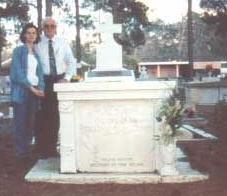
Photos above are from the Irish in Korea
 Find a Grave: John Corcoran, interred with his uncle William in Lafayette, LA.
Find a Grave: John Corcoran, interred with his uncle William in Lafayette, LA.
======
“At first, tributes trickled in to the Guest Book that Marilyn has thoughtfully added. One was from Paul Olivier in Lafayette, Louisiana, to his buddy John Corcoran from Millstreet, Co. Cork. Corcoran, who was mortally wounded in September 1950 in what is euphemistically referred as a “friendly fire” incident. The wounded Irishman landed on Olivier’s back, likely saving his buddy’s life. Since the Corkman’s uncle passed away, Olivier has loving tended to John’s grave.” from Finding the Names, Reflections on a Labor of Love, by Brian McGinn
======
“Private John Corcoran of County Cork was killed when he shielded with his own body a previously wounded comrade when his unit came under attack by enemy mortars.” – from Lest We Forget: the Forgotten Irish American Soldiers of the Forgotten War
======
Posthumous Citizenship
In 2003, the of U.S. granted citizenship to the 28 Irish men that died in the Korean War.
“… Then there is the story of John Corcoran, Private First Class, U.S. Army, 32nd Infantry Regiment, 7th Infantry Division. In September 1950, after an early morning crossing of the Han River, mortars blasted Private Corcoran’s unit, wounding and killing many.
In what was pure reaction, Private Corcoran nobly fell on top of another soldier. To this day, Private Corcoran’s tomb in Lafayette Parish, Louisiana is cared for by the soldier whose life he saved.”
– from Eduardo Aguirre, Director U.S. Citizenship and Immigration Services, “Irish in Korea” Posthumous Naturalization Ceremony October 30, 2003 where John was posthumously granted US citizenship.
The 28 Irish GIs Who Died in Korea (July 2006)
The Fighting Irish Of The Korean War
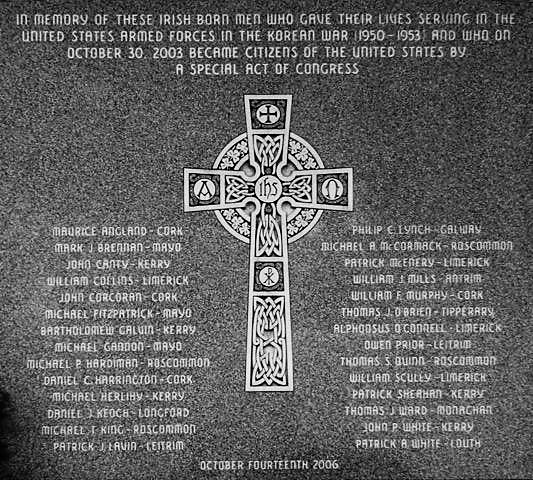 The Irish Korean War Memorial in Green-Wood Cemetery, Brooklyn, New York
The Irish Korean War Memorial in Green-Wood Cemetery, Brooklyn, New York
======
“Heart-rending scenes like this became all too common between 1950 and 1953, as most of the Irish dead were laid to rest in their native soil. Their homes spanned eleven separate counties and all four provinces, with the highest tolls–four casualties each–falling on Cork, Kerry and Limerick, closely followed by Co. Mayo’s three.
Their ages at death ranged from 21 to 27, with the majority in their early twenties. Their fathers were predominantly farmers or laborers. Their mothers were mothers. It was, you might be forgiven for thinking, a simpler and unsophisticated time. But simplicity can be an insidious and irrelevant conceit. As if, in the absence of instant messaging, young men could not live and laugh and love as intensely as their modern, tech-savvy counterparts.
Most had left Ireland in 1947 and 1948, as emigration reopened in the wake of World War II. None could have anticipated that a sudden and unexpected war in an Asian nation that most would have known only as a mission field for the Columban Fathers would soon profoundly transform their lives. A War whose casualties would include five Irish-born Columbans. And Sr. Mary Clare, an Anglican nun from Enniskerry, Co. Wicklow.
Among the military dead, four had volunteered for military service: John Corcoran from Cork, John Dillon from Limerick, Michael Gannon from Mayo and Thomas O’Brien from Tipperary. The rest–like their majority of their American comrades–were draftees.”
– from Quiet Heroes of a Forgotten War
======
Private First Class Corcoran was a member of the 32nd Infantry Regiment, 7th Infantry Division. He was seriously wounded by the enemy while fighting near the Han River, South Korea on September 24, 1950 and died of those wounds on October 2, 1950. ** Private First Class Corcoran was awarded the Purple Heart, the Combat Infantryman Badge, the Korean Service Medal, the United Nations Service Medal, the National Defense Service Medal, the Korean Presidential Unit Citation and the Republic of Korea War Service Medal.
– from Korean War Veterans Memorial Honor Roll
======
“John Corcoran was from or last resided in Lafayette county, Louisiana .. (According to our records Louisiana was Corcoran’s home and/or enlistment state).
Enlisted in the Army. Service number 18280733. Served during the Korean War. Rank of Private First Class. Served with 7th Infantry Division unit 0032. Service occupation of Light Weapons Infantryman.
Corcoran experienced a serious casualty and/or loss of life on September 24, 1950. This occurred in or around South Korea. Circumstances of death attributed to .. “Seriously wounded in action by missile”. Buried or memorialized at Buried in Calvary Cemetery, Lafayette Parish, LA.
SEP 24, 1950 Wounded in Action South Korea .. OCT 2, 1950: Died of Wounds Osaka Hospital, Japan”
– from Honourstates.org
=======
“September 24th – Afternoon – 32nd Infantry cross Han River lightly opposed in morning aboard 1st Amphibian Tractor and 56th Amphibious Tank and Tractor Battalions followed by 17th ROK Infantry,”
The manouver was to create a bridgehead on the opposite side of the Han River for US forces to be able to enter Soeul. This was the start of the Battle of Soeul. Military manoeuvers can be see here on page 86-88 of “Inch’on 1950: The last great amphibious assault”
=======
First Name: John
Last Name: Corcoran
Birthplace: Millstreet, IRL
Gender: Male
Branch: Army (1784 – present)
Home of Record: Lafayette, LA
Date of Birth: 03 September 1929
Date of Death: 02 October 1950
Rank: Private First Class
Years Served:
Biography: Private First Class Corcoran was a member of the 32nd Infantry Regiment, 7th Infantry Division. He was seriously wounded by the enemy while fighting near the Han River, South Korea, on 24 September 1950 and died of those wounds on 2 October 1950.
Awards
Purple Heart
National Defense Service Medal
Korean Service Medal
United Nations Service Medal
Republic of Korea War Service Medal
Republic of Korea Presidential Unit Citation
Combat Infantryman Badge
– from Military Hall of Honour
======
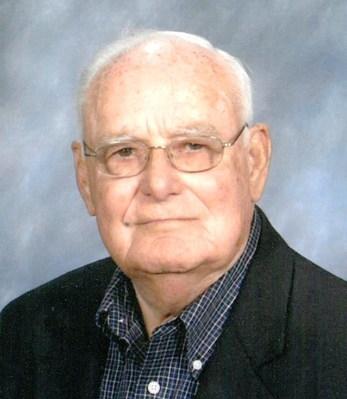
Paul Russell Oliver, the man that John saved at the expense of his own life is pictured (above) with his daughter beside John’s place of rest. He and his family have taken care of his grave in Lafayette since John’s uncle William passed away in 1957.
Paul passed away in 2014, and his obituary is on Legacy.com, [2] and also on FindAGrave.com.
His son Terence made contact with us through the comments below.
=======
Others with Millstreet connections that fought in the Korea War
- John Duggan – formerly of Claraghatlea (brother of our poet Francis Duggan). He was a pilot in the US Air Force
- Jay Becker – husband of Sheila O’Sullivan, Claraghatlea
- Daniel J Dennehy – born March 21, 1928 in New York City, a son of Edward and Albina (Casey) Dennehy of Millstreet, Co. Cork
- John J O’Sullivan, of North Horsemount, Kilcorney

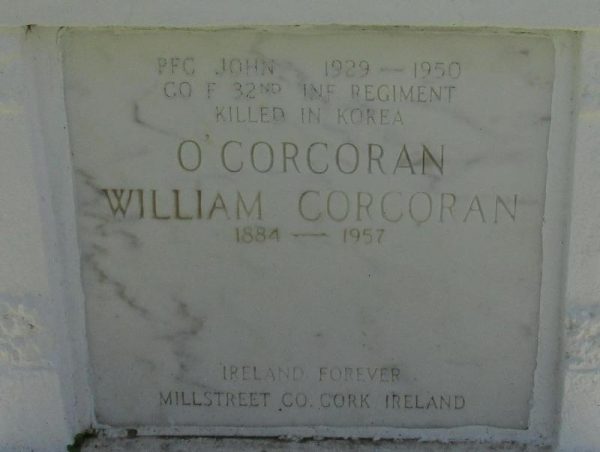
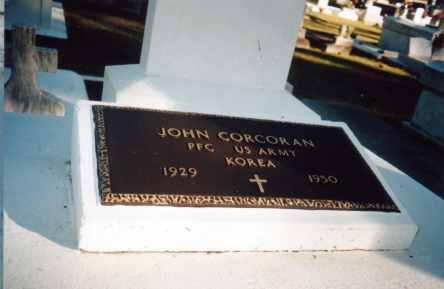
I do remember so well the day John Corcoran’s father came into Cullen national school to let us know his son had been killed in Korea John Corcoran had been a pupil of Cullen national school our headmaster Roger Kiely long deceased who was quite emotional at the news suggested that we should all kneel down and say the rosary which we did it was a rather sad morning Denis O’Sullivan Cullen and London
A young man who was not destined to grow old
The story of John Corcoran of Coolikerane in Duhallow one i often heard told
By people far older than i was then decades ago
Long before this thing known as time had become my foe
John in his late teens went off to the U S of A
Where by the U S Army he was sent to fight in Korea in a war far away
Where he was badly wounded and from his injuries died in a hospital in Japan
He died as he lived a heroic young man
He died without children or without a wife
And to save the life of another he sacrificed his own life
Posthumously decorated by the U S Army for his acts of bravery
Yet his tragic passing a sad time in Coolikerane for his friends and family
Stories of war never make for a happy read
And one war to another only does seem to lead
The article published by Michael Cashman on the Millstreet Web Site another sad story of war
Of a brave young man who died in battle from his home Parish afar
And the comment by Denis O Sullivan a pupil then at Cullen School of how John’s dad
Broke the news of his son’s death to Roger Kiely the Principal was so very sad
Time is the great healer as the wise one does say
But sad like happy memories for decades in the memory tend to stay
In Coolikerane in Millstreet Parish his life’s journey began
And he migrated to the U S A as a young man
He never had the chance for to father children and live on for to grow old and gray
For he died as a young hero in a war far away.
“John Corcoran” is by Francis Duggan
http://francisrhymer.blogspot.ie/2015/04/john-corcoran.html
(added by mdc)
This is so sad – especially for the family he left behind. I will keep his name in my prayers and will add his name anytime a local list is being made of deceased servicemen.
Rest in peace, John!
My father Paul Olivier was the man that John saved. He was also injured that day, but later recovered from his wounds. He went on to become a Louisiana State Trooper, retired and had a successeful printing business. He also had seven children, four boys and three girls. I am the youngest of the family and as another of my older brothers became a police officer. My father passed away in December of 2014. I am eternally greatful for Mr. Corcoran’s sacrifice. My family will always look after his grave. If you can see the picture my father sent many years ago, there is a mausoleum behind him, that is where he is now buried. I hope all of you will take comfort in the fact that John was buried next to a priest my father knew, and on All Saints day we would was the graves. Once again I would like to extend my eternal garatitude to Mr. Corcoran and his family. Sincerely, Terence Olivier.
70 years yesterday..
Are you a relative of John’s?
Yes. Pat corcoran. His nephew.. I live in the house he was raised in..